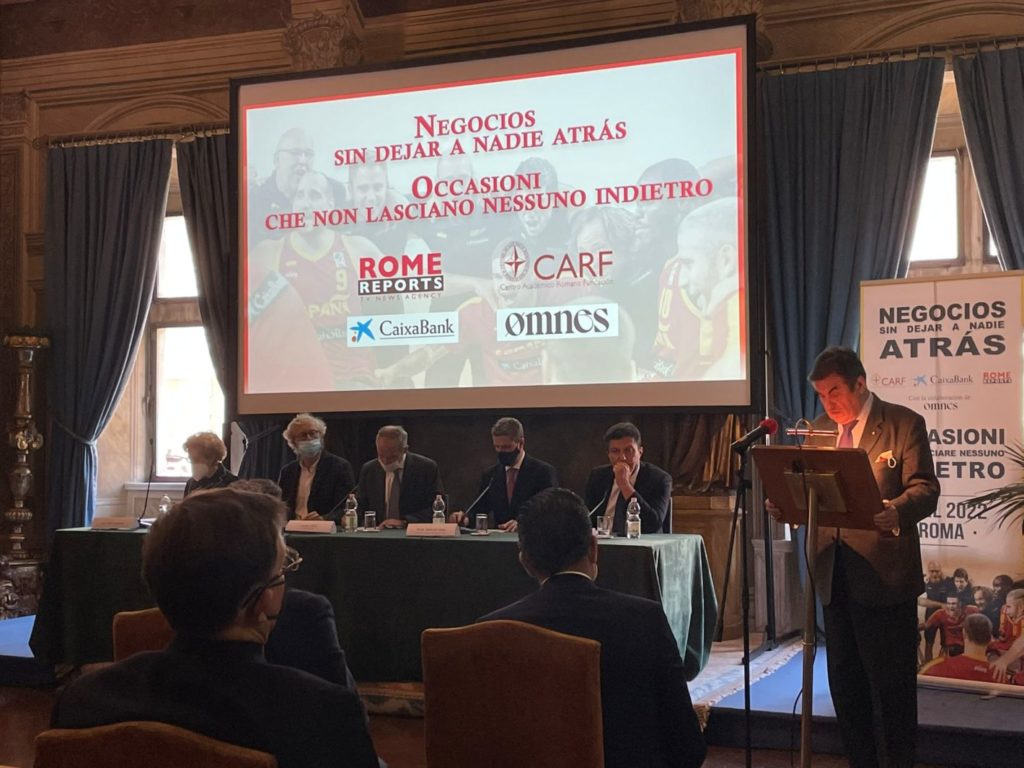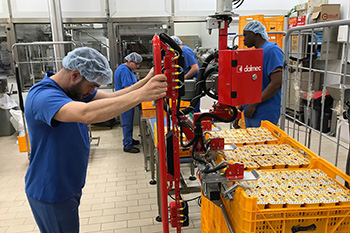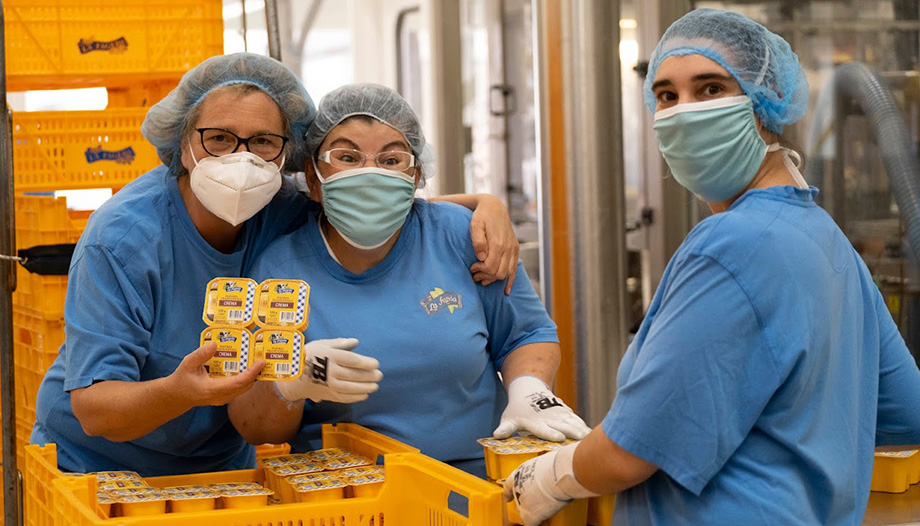The need for a model of development that is just, supportive, inclusive and integrally sustainable, as proposed by Pope Francis, was the frame of reference of the day, held at the "Palazzo della Rovere", headquarters of the Order of the Holy Sepulchre in Rome, and organized by the Rome Reports agency, the Roman Academic Center Foundation (CARF) and Omnes, sponsored by CaixaBank.
Anna Maria Tarantola, who has been General Manager of the Bank of Italy and President of RAI, was a keynote speaker at the event, which was attended by CaixaBank executives such as David Alonso de Linaje, head of Religious Institutions at Caixabank; Albert Riera, Director of International Relations at La Fageda, the leading yogurt company in Catalonia, which has employed young people with disabilities; and Davide Rota, CEO of Linkem, which employs dozens of people in Italian prisons. The Governor of the Holy Sepulchre, Leonardo Visconti di Modrone, thanked the role of "the companies that have managed to mitigate the consequences of the crisis for the most vulnerable".
All brought to the table, moderated by Antonio Olivié, CEO of Rome Reports, the testimony of successful business models that leave no one behind, focused on people. Models that, as Anna María Tarantola pointed out, show "how inclusion can be achieved while obtaining good results".
The encyclical Laudato si', which is above all a social encyclical, as scholars have reiterated, and the Social Doctrine of the Church, with its emphasis on the search for the common good and on considering the enterprise as "a community of persons" and "not only as a society of capital", as underlined by Saints John XXIII and John Paul II, provided the backbone for the arguments of Anna Maria Tarantola.
Distortions that do not disappear
"Seven years ago, with the encyclical Laudato si', Pope Francis addressed to all people of good will the strong and clear invitation to work urgently to remedy the many distortions we were experiencing: the waste of non-renewable resources, the reduction of biodiversity, climate change impacting especially on the poor, the water and food crises, the widening economic gaps and social inequalities, the spread of the throwaway culture of people and things," Tarantola explained.
However, "unfortunately, these distortions have not disappeared," he said. "Improvements have been very slow, uneven and fluctuating. Moreover, the situation has been aggravated by the pandemic that has widened inequalities, impoverished the poor and the rich, and clearly highlighted the failures of the current model of development before which the voice of the Church stands. Pope Francis, acting in the ancient tradition of the Social Doctrine of the Church, in all his numerous interventions calls loudly for a change of era, for a regeneration".
"We cannot help but wonder why, despite the many pressing invitations from the Holy Father and the obvious unsustainability of the current situation, the process of regeneration has not been accelerated by turning things around," posed the president of Centesimus Annuswhich, as is well known, is the encyclical published by St. John Paul II in 1991, one hundred years after Pope Leo XIII's Rerum Novarum (1891).
"I think the reasons are different," he countered. "But above all two are of particular importance: the persistent widespread fear of change and the prevalence of a short-term view that is associated with a deeply ingrained belief that both market forces are capable of finding new equilibria on their own."


Entrepreneurs according to "Fratelli Tutti".
At this point, Anna Maria Tarantola recalled Pope Francis in his encyclical "Fratelli tutti", when he refers to entrepreneurial activity. "The activity of entrepreneurs indeed 'is a noble vocation aimed at producing wealth and improving the world for everyone.' God promotes us, expects us to develop the abilities He has given us and has filled the universe with potential. In His designs each person is called to promote his or her own development, and this includes the implementation of economic and technological capabilities to grow assets and increase wealth. However, in any case, these abilities of entrepreneurs, which are a gift from God, must be clearly oriented towards the progress of other people and the overcoming of poverty, especially through the creation of diversified work opportunities" (Fratelli tutti, 123).
"This step is really important, and it is closely linked to the theme of this meeting, which aims to present testimonies of how one can be a 'good company,'" he said. In his opinion, "being a good company in the 21st century means, as the SDC [Swiss Agency for Development and Cooperation] points out, considering the company as a community of people working for a common goal that is not the creation of value, in the form of profit, only for shareholders, but the production of profits with a positive impact on creation and for all those who in some way contribute to the success of the company and, therefore, for employees, customers, suppliers and the territory in which the company operates."
"Good business is a company that feels responsible for the consequences of its work on an economic, social and environmental level, that does not aim to make a high profit by polluting, selling inferior products, treating its employees, customers and suppliers badly... 'Good business' does not impose high human and environmental costs on the community and succeeds, in doing so, in producing long-term shareholder value, as shown by not a few researches," stated among other things Anna Maria Tarantola.
Sustainable business models
Omnes asked David Alonso de Linaje, head of Religious Institutions at CaixaBank, to summarize his contribution to the Roman meeting. The executive's reflections go in the same direction. "We live in a world of great changes. In just a few years the technological world has undergone a great transformation that has caused society to modify its habits of consumption and of living life. To this we must add the bitter experience of the pandemic and, if that was not enough, a war that is keeping the world on tenterhooks because of its human and economic consequences".
"It is time to reflect and evolve. In terms of economics, seeking a balance between profitable businesses that at the same time seek to have a positive impact on society is the perfect thing to do. Examples such as Linkem, La Fageda or CaixaBank and Fundación la Caixa, are sustainable business models that look after society, workers and help the most disadvantaged. The future looks challenging but full of reasons for the business model par excellence to be the one that leaves no one behind," adds the Caixabank executive.
Commitment to peace and the Ukraine emergency
David Alonso de Linaje also provided global data on the bank's humanitarian aid, in response to questions from Omnes, as well as some relating to Ukraine. "In coherence with the founding values of la Caixa and its social commitment, Obra Social aims to be an entity of reference on an international scale, committed to human rights, peace, justice and the dignity of people. In this regard, it should be noted that for 2022 it has a budget of 515 million euros, of which 308 million are earmarked for social programs and calls, 110 million for culture and science, 44 million for education and scholarships, and 53 million for research and health."
"Among its many actions," adds Alonso de Linaje, "it is worth mentioning this year the support measures in favor of the emergency in Ukraine through financial contributions from our foundation, contributions from employees and customers through the various donation platforms and the implementation of a convoy of 10 buses organized in two shifts, and a team of 50 people, including employees of the entity, volunteers, translators and medical personnel, who have transferred people affected by the war who have requested shelter in Spain".
Linkem, La Fageda
As noted above, Davide Rota, CEO of Linkem, a technology company that has developed a modem repair project with Italian prison inmates, assured that "when a company or a group of people have clear principles, making decisions is not difficult", and he knows that most of those in prison are recoverable. Today, in spite of the difficulties, his model is successful in Italian prisons, and some ex-prisoners are already in his company, as reported by Antonio Olivié in "El Debate".


The Roman event also included the presentation of La Fagedaa Catalan company that has hired numerous disabled people from the region. Albert Riera pointed out that "this company started backwards from the way a company should start. First there were the people and, from there, they thought about what they could do together, without 'know how', without a 'business plan', or anything like that". Their ideas can be summarized, as reported by Antonio Olivié, in "not having cheap labor, having contact with nature and not being a mere commercial company, but a social, non-profit company". Today, the yogurt of this company is the best seller in Catalonia.
Alonso de Linaje, from Caixabank, also mentioned the "No home without food" program, to which "between 2020 and 2021 almost six million euros have been channeled, of which two million were contributed by our own Foundation". There have been more than 2,400 tons of food to feed 8,935 families during the twelve months of the year. "The CaixaBank network has made it possible to channel those who have not suffered special problems during the pandemic to help other families".
A management model
In addition, CaixaBank has developed a management model specialized in religious institutions, with a value proposition that revolves around four axes and has been built under the document "Economy at the service of the charism and mission", issued by the Congregation for Institutes of Consecrated Life and Societies of Apostolic Life.
These axes, explains the bank's executive, are "on the one hand, the specialization embodied in dedicated and trained managers for this task. Secondly, a financial advisory model based on independent proposals, free from conflicts of interest, in line with the criteria determined by the Social Doctrine of the Catholic Church, socially responsible and impact investment. And finally, as a central axis in the advice, financial planning through a unique tool in the sector, based on four objective portfolios (liquidity, income generation, provision for the dependent members of the institutions and portfolio of wealth growth). In addition, it is worth mentioning our commitment to the training of trustees and administrators of Religious Institutions".
What model of capitalism
Among the topics of reflection at the event was capitalism. On corporate responsibility, the president of the Centesimus Annus Foundation, Anna Maria Tarantola, recalled a passage of St. John Paul II in this social encyclical.
"Wondering whether capitalism was the path to true economic progress, he wrote: "The answer is obviously complex. If 'capitalism' indicates an economic system that recognizes the fundamental and positive role of enterprise, the market, private property and the consequent responsibility for the means of production, of free human creativity in the field of economics, the answer is certainly positive, although perhaps it would be more appropriate to speak of 'business economics,' or 'market economics,' or simply 'free economics.' But if by 'capitalism' we mean a system in which freedom in the economic sector is not framed in a solid juridical context that places it at the service of integral human freedom and considers it as a particular dimension of this freedom, whose center is ethical and religious, then the answer is decidedly negative" (Centesimus Annus, 42).
"This step, not always mentioned, is in my opinion the foundation on which companies must build their way of being and operating," said Tarantola, who added: "Unfortunately, in the last fifty years a model of super-liberal capitalism has been affirmed, guided by consumerism, individualism, the financing of the economy, the almost exclusive focus on quantitative economic growth, while neglecting the social and cultural, the affirmation of an absolute faith in technology. And there is the mantra of 'creating shareholder value' as the sole purpose of business, as Milton Friedman argued more than 50 years ago in the 'Financial Times'. Pope Benedict XVI in 'Caritas in Veritate' and Pope Francis in 'Laudato si'' have highlighted its degenerations and harms."
"Pope Francis," concluded Anna Maria Tarantola, "who is today the point of reference not only spiritually and morally, but also culturally, economically and socially for all peoples, invites us to urgently change our lifestyle and the goals of business, politics and institutions to strive for a new just, inclusive, supportive and sustainable world."












